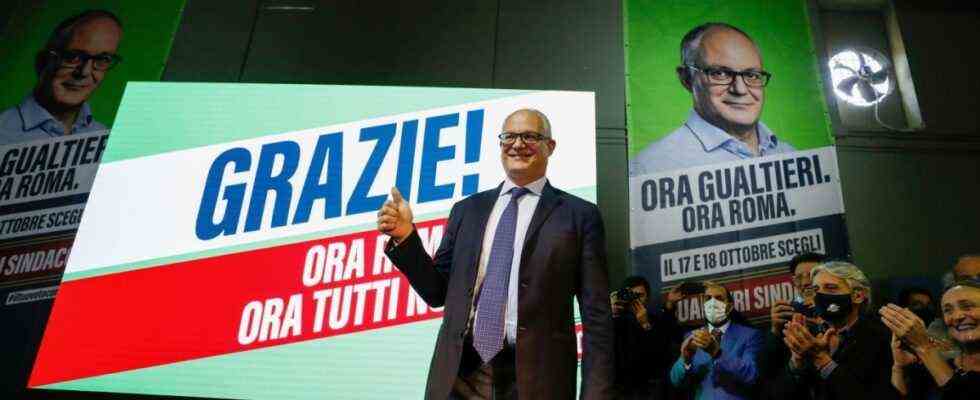Five to zero. In the municipal elections in Italy, the Social Democrats win in all five large cities that were advertised. After Milan, Naples and Bologna, where their applicants were chosen in the first round, Rome and Turin are now also joining where a runoff was necessary. 5: 0 – a few months ago nobody would have thought this result was possible. The partial election represents a bitter defeat for the right, which stood united. The results are in stark contrast to the national polls of the three coalition partners Lega, Fratelli d’Italia and Forza Italia. The defeat is particularly painful in Rome: Rome is traditionally a real stronghold.
The new mayor of the capital and successor to Virginia Raggi from the Cinque Stelle is Roberto Gualtieri, 55 years old, from the Partito Democratico. Gualtieri was a member of the European Parliament for a long time and from 2019 to February 2021 Italian Minister of Finance and Economy. He beat the right-wing candidate, Enrico Michetti, so clearly that the television stations dared to make a clear forecast shortly after the polling stations closed. Michetti, a lawyer and long-time talker on the Roman local radio station Roma Roma, was largely unknown to the general public when the campaign began. In the archives one found anti-Semitic and racist sentences that he had said on the station about Jews or African immigrants, for example, or that he had written on their homepage.
The Cinque Stelle flop is extensive
Michetti had suggested the leader of the post-fascist party Fratelli d’Italia, the great climber of the past few months and the only opposition in the country: Giorgia Meloni, herself a Roman. She saw the election in Rome as her personal ramp to power, was already ready as a possible future Prime Minister of Italy – and she figured that she could replace her political ally and rival Matteo Salvini, head of the Lega, as the leader of the right-wing camp . Now she suffers her first major setback. Michetti was an adventurous, crazy bet. All Gualtieri had to do was let the improvised candidate speak: this made his own résumé all the more radiant.
In Turin, too, the left won the runoff elections: Stefano Lo Russo, 45, professor of geology at the Politecnico, beat the wine entrepreneur Paolo Damilano, who had been set up by the Lega. Shortly before the election, Damilano tried to distance himself from the right-wing parties because he feared that their partly extremist positions during the pandemic would cost him votes.
As in Rome, the Cinque Stelle protest party had ruled Turin for the past five years. Cities were seen as test laboratories, showcases of their ability to manage large cities. The flop is obvious. Chiara Appendino, the previous mayor of Turin, did not even present herself for re-election. Your replacement won only nine percent of the vote in the first round. And so the five stars are among the big losers in these elections.
Former Prime Minister Giuseppe Conte, who had only been party leader of the Cinque Stelle since August, only achieved good results in those cities where he had formed a coalition with the Social Democrats, namely in Naples and Bologna. Conte now wants to position the party in the political center to stop its decline. Up until now it was thought that Conte would manage to set up the Cinque Stelle with his sheer popularity. It is probably too early to take stock, but its impact so far has been weak. On the other hand, the Cinque Stelle have always been stronger in national elections than in local and regional ones.
If one had to give the winner of these elections a face, it would be that of Enrico Letta, 55, Italian prime minister from 2013 to 2014. Letta has only been chairman of the social democratic Partito Democratico since last March. Of all the ruling parties on the side of Prime Minister Mario Draghi, the “Democratici” are the most loyal. And this closeness to the popular Draghi is probably earning them additional favor.

